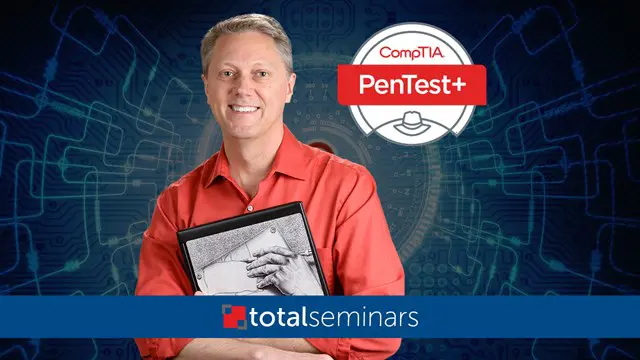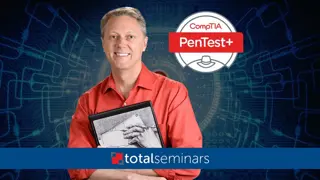
TOTAL: CompTIA PenTest+ (Ethical Hacking)
From Total Seminars: Michael Solomon on ethical hacking & high-level penetration testing. Hack like a pro.
Total Seminars, LLC
Summary
- Reed Courses Certificate of Completion - Free
Add to basket or enquire
Overview
What you'll learn
-
How to plan and scope a penetration test as a contracted pen tester for a client (as an ethical hacker, you’ll be the good guy and get paid to hack networks!)
-
How to work within a virtual environment to practice your pen testing skills, including using Oracle VM manager, Kali Linux, Metasploitable, and DVWA
-
Where to find vulnerabilities and how to penetrate a network in order to run exploits, then how to report those vulnerabilities to the client for remediation
-
How to gather intel on a network by scanning and enumerating (finding) targets, then searching out the weak points on those targets
-
Understand social engineering attacks, exploit network-based vulnerabilities, and intercept traffic via on-path (man-in-the-middle) attacks
-
How to use pen testing tools like Nmap, Nessus, Nslookup, John the Ripper, Immunity Debugger, Aircrack-NG, Wireshark, and many more
-
How to write reports, explain post-delivery activities, and recommend remediation strategies to your client
Curriculum
-
Course Introduction 09:30
-
Planning and Engagement 2:50:03
-
Information Gathering and Vulnerability Scanning 3:36:44
-
Network-Based Attacks 44:12
-
Selecting Pen Testing Tools 25:51
-
Reporting and Communication 2:03:23
-
Attacking the Cloud 14:29
-
Specialized and Fragile Systems 49:03
-
Social Engineering and Physical Attacks 49:52
-
Post-Exploitation 41:30
-
Post Engagement Activities 1:07:55
-
Tools and Programming 2:09:22
-
Tools Inventory 1:36:38
Course media
Description
Mike Meyers and the Total Seminars Team, your source for best-selling cybersecurity courses, brings you this ethical hacking and penetration testing course with your instructor Michael Solomon, Ph.D., CISSP, PMP, CISM. Prepare for the CompTIA PenTest+ PT0-002 exam.
This is NOT a boring voice over PowerPoint course. Michael speaks to you and presents the material in an engaging interactive style that will keep you interested and make it easier to understand. Check out the free sample lectures and you will see the difference.
With 30+ years of experience in security, privacy, blockchain, and data science, and an energetic presentation style, Michael takes his proficiency in network penetration testing and consolidates it into this informative and engaging course.
Whether you're looking to pass the CompTIA PenTest+ certification exam, take your next step in the CompTIA Cybersecurity Pathway, or you're just looking to learn some awesome ethical hacking skills, you’re in the right place.
Keep in mind there's much more to being an ethical hacker than what's covered here, including how to secure a network, however this course focuses on how to be a pen tester. A pen tester plans and scopes a pen test engagement with a client, finds vulnerabilities, exploits them to get into a network, then reports on those findings to the client.
This course shows you how to:
-
Use the tools you’ll need to scan networks, crack passwords, analyze and intercept traffic, discover code vulnerabilities, and compromise resources
-
Recognize vulnerabilities within a system, run exploits, and suggest solutions to a client to remediate the weak points
-
Work within a virtual environment to practice your pen testing skills, including using Oracle VM manager, Kali Linux, Metasploitable, and DVWA
-
Scope, plan, and execute a pen test engagement from start to finish
WHAT'S COVERED?
PenTest+ Exam Domain - Percentage of Exam
1.0 Planning and Scoping - 14%
-
Compare and contrast governance, risk, and compliance concepts
-
Explain the importance of scoping and organizational/customer requirements
-
Given a scenario, demonstrate an ethical hacking mindset by maintaining professionalism and integrity
2.0 Information Gathering and Vulnerability Scannings 22%
-
Given a scenario, perform passive reconnaissance
-
Given a scenario, perform active reconnaissance
-
Given a scenario, analyze the results of a reconnaissance exercise
-
Given a scenario, perform vulnerability scanning
3.0 Attacks and Exploits - 30%
-
Given a scenario, research attack vectors and perform network attacks
-
Given a scenario, research attack vectors and perform wireless attacks
-
Given a scenario, research attack vectors and perform application-based attacks
-
Given a scenario, research attack vectors and perform attacks on cloud technologies
-
Explain common attacks and vulnerabilities against specialized systems
-
Given a scenario, perform a social engineering or physical attack
-
Given a scenario, perform post-exploitation techniques
4.0 Reporting and Communications 18%
-
Compare and contrast important components of written reports
-
Given a scenario, analyze the findings and recommend the appropriate remediation within a report
-
Explain the importance of communication during the penetration testing process
-
Explain post-report delivery activities
5.0 Tools and Code Analysis 16%
-
Explain the basic concepts of scripting and software development
-
Given a scenario, analyze a script or code sample for use in a penetration test
-
Explain use cases of the following tools during the phases of a penetration test
Who is this course for?
- Anyone interested in ethical hacking, pen testing, vulnerability testing, and network security
- Anyone looking to prepare for the CompTIA PenTest+ (PT0-002) exam
- Security Analysts, Network Security Ops, Application Security Vulnerability Analysts
Requirements
-
There are no requirements to take this course, nor are there any requirements to sit for the CompTIA PenTest+ exam, however, basic familiarity with networks and network security is suggested
-
It’s recommended to be familiar with the information in the CompTIA Network+ and Security+ exams
-
Although this course is a CompTIA PenTest+ exam prep, it’s also designed for a broader audience, so those without much network security knowledge can still gain valuable information on pen testing and ethical hacking
Questions and answers
Currently there are no Q&As for this course. Be the first to ask a question.
Certificates
Reed Courses Certificate of Completion
Digital certificate - Included
Will be downloadable when all lectures have been completed.
Reviews
Currently there are no reviews for this course. Be the first to leave a review.
Legal information
This course is advertised on reed.co.uk by the Course Provider, whose terms and conditions apply. Purchases are made directly from the Course Provider, and as such, content and materials are supplied by the Course Provider directly. Reed is acting as agent and not reseller in relation to this course. Reed's only responsibility is to facilitate your payment for the course. It is your responsibility to review and agree to the Course Provider's terms and conditions and satisfy yourself as to the suitability of the course you intend to purchase. Reed will not have any responsibility for the content of the course and/or associated materials.


